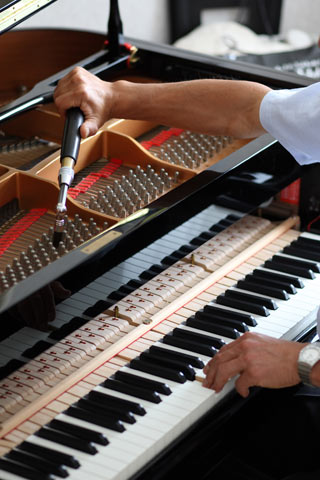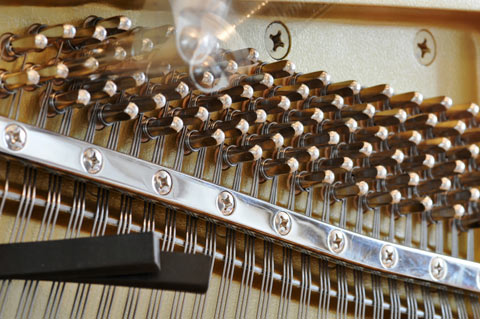Piano tuning is a technical skill obtained through a combination of proper training and lots of practice.

Tuning is by far one of the most important aspects of piano maintenance. Frequency of tuning depends on many different factors. These factors include the location of the piano, the age of the instrument, and the piano’s usage. Piano manufacturers recommend a piano in the home be tuned every six months to one year depending upon the pianist preference. Tuning frequencies increase for pianos that are used in teaching environments, churches, and concert venues. I can help you best assess the frequency that will fit both your budget and the piano’s needs.
Allowing a piano to go more than one year without being tuned may result in a gradual drop in pitch below the piano’s original design. Restoring a piano to pitch in this instance requires a “pitch raise” before a fine tuning can be done on the instrument.
Pianos contain an average of 230 strings or more requiring adjustment. When a piano falls below pitch, additional tuning is required depending on how far the piano has drifted. Because this process requires more time to complete, additional charges apply. In most cases, a piano can be restored to pitch with one additional pass across all strings resulting in an additional $30.00 charge.

Because each piano is different, assessing the piano is required to determine the best way to bring the piano to pitch. In many cases, the pitch raise can be done during the same visit as the fine tuning. In some extreme cases, however, I may recommend the pitch raise on the first visit, followed by a second visit for the fine tuning. These determinations can only be made after inspecting the piano in person. A piano that is tuned regularly maintains the proper amount of tension and results in tunings that are more stable, thereby increasing a piano’s usable life.
Pianos used in playing modern music are most often tuned to Equal Temperament. The distances between the bottom and top notes in an octave are divided into 12 equal pieces. Well-trained Piano Technicians use a series of test intervals to determine if the notes are in tune in relation to one another. Properly positioning each note is the art of fine piano tuning.
Excellent piano tuning is not a subjective thing performed by a person with a “good ear” or superior hearing abilities. Piano tuning is a technical skill obtained through a combination of proper training and lots of practice.
